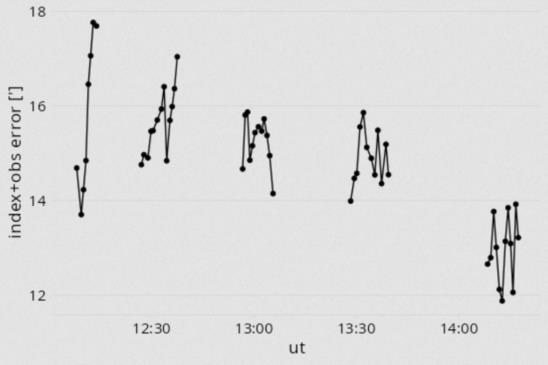
NavList:
A Community Devoted to the Preservation and Practice of Celestial Navigation and Other Methods of Traditional Wayfinding
From: Matus Tejiscak
Date: 2024 Mar 3, 08:30 -0800
Dear NavList,
a couple of years ago, I was lucky enough to buy an A-12 off Geoffrey Kolbe. I suspected it would be in a good condition but the instrument and its equipment surpassed even the high expectations I had. So far so good.
What I'm struggling with, though, is the index (+ personal?) error. It seems to be floating wildly anywhere between +10' and +17' (up to some +20' when observing stars at night), with the median value around +14'. Hand shake and random measurement errors I can deal with using statistics. But every session yields a different index error with small standard deviation, and that's something I feel helpless about. I don't know if it's an instrument error or a personal observation error.
For illustration, I attach an plot of intercepts from today's batch of observation sessions of the Sun, starting shortly after the local noon. The index error that minimises the entire set of observations is +14.8'. But each session yields a different optimal value: the index error already goes down visibly as time passes, and before the last session, the index error plummets. Yet within a single session, the observations tend to stay within ±1', which is the nominal precision of the instrument.
The observations were made from the A-12 mounted on a tripod, indoors, through a glass window, over the course of a couple of hours. (Observations in the last session were made through a different window as the Sun had moved but I don't expect that to have such an effect. I observe the same when there's no window in the way as well.)
Some time ago, I placed an aquarium sticky-strip thermometer on the body of the sextant, which gives me an idea about temperature changes to about 1°C. The temperature displayed remained stable, slowly decreasing from 26°C to 24°C (the thermometer has clearly an index error of its own but only the rough temperature difference is important, I believe). Linear regression over observations from the past 2 years, including observations from freezing snowy hills to hot summer days, shows temperature as a borderline significant predictor of the index error but the inferred effect size (-0.01 to -0.25 '/°C, 95% CI) is insufficient to explain the large variation, anyway. So it does not seem that the temperature would be the cause.
Moreover, if I plot the index error as a function of the observation number within a session, the resulting curve sometimes increases, sometimes decreases, and sometimes it does not have any obvious trend. One explanation could be that with a rising body, the index error appears lower because of a possible delay until I glance at my watch -- and the variations in the index error seems to have the right sign for this. However, today the Sun never descended faster than 0.1'/s, which would require a delay of some 20 seconds to cause the observed systematic error of 2'. Hence this does not look like an explanation, either.
Geoffrey did mention the unpredictability of the index error, which he attributed to temperature variations in the desert.
The single weakness of the bubble sextant is the inability to easily check the index error, as one is able to do with a marine sextant. On this trip, I seemed to have a problem with a wandering index error. It may be that in the heat of the desert, the aluminium body of the sextant warped and this resulted in a change in index error. When the index error became suspect, I was forced to adopt a strategy of choosing stars and sun sights in opposing pairs to cancel out the index error, whatever it was.
But with the same instrument, he reported a years-long stable index error of +7' (except for the harsh desert conditions), as opposed to the unstable error of +14' that I observe in the mild conditions of my living room (and elsewhere).
What am I doing wrong? Any ideas? Could my eye's idea of what two concentric circles should look like be drifting over the hours? Or is it the hardware?







